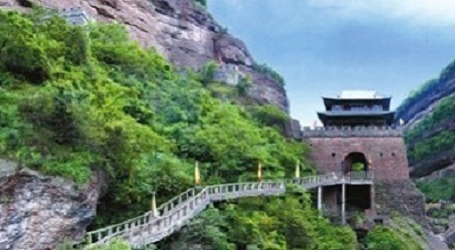-
-

- 2015-10-16 国际之声
“文化遗产会改变什么”主题会议将于明年6月在蒙特利尔召开
Association of CriticalHeritage StudiesThird Biennial ConferenceMONTREAL, CANADA | 6 -10th JuneHeritage is a powerful witness to mindsets and Zeitgeist; it is commonly understood that it gives way to a better understanding of societies and even brings together communities. But how does this happen? Can heritage affect reality? What does it change?In order to bring new insights to the study of heritage, the 2016 Association of Critical Heritage Studies (ACHS) Conference is framed by the general question of “What Does Heritage Change?”This third announcement calls for submissions of papers and posters. The deadline for the call for papers and posters is 1st November 2015.For more information, please visit http://achs2016.uqam.ca/en/
-
-
-

- 2015-10-16 国际之声
亚太地区文化线路保护与管理研修班将于下月在四川举办
WHITRAP Training Course on the Conservation and Management of the Cultural Routes in the Asia-Pacific RegionApplication Deadline: October 20, 2015Time: 5th – 14th November. 2015Place: Guangyuan, Mianyang, Chengdu in Sichuan Province, ChinaMain OrganizerWorld Heritage Institute of Training and Research for the Asia and the Pacific Regionunder the auspices of UNESCO (Beijing)Sponsor and UndertakerHuangze Temple Museum in Gunangyuan CityMianyang Bureau of Culture, Broadcasting, Television, Press and PublicationChengdu Relic Information Consultation CenterSupportingCultural Relics Bureau of Sichuan ProvinceBrief Background to the Training Course:Linear heritages and cultural routes are important heritage types. They are typically found in a linear arrangement, reflect cultural communication and interaction, and span over relatively long period and large space, such that they present particular challenges in their conservation and management. There are several major linear heritages and cultural routes in the Asia-Pacific Region and some of them were already listed in the World Heritage List, including Mountain Railways of India (1999,2005,2008), Sacred Sites and Pilgrimage Routes in the Kii Mountain Range (2004), Land of Frankincense (2000), Silk Roads: the Routes Network of Changan-Tianshan Corridor (2014), The Grand Canal(2014), and the Chinese government is in the process of preparing for the nomination of the Sichuan Road. With the goal to promote the world heritage application for linear heritage and cultural route, and to strengthen the conservation and management of this specific heritage type, WHITRAP is proposing to organize a Training Course on the Conservation and Management of cultural routes in the Asia-pacific Region in Sichuan Province in China in the autumn 2015, basing on the successful experience of the sub-Forum of Beijing Forum 2014-the Silk Road in the Past and Present: Dialogue, Communication and Cooperation among the cultures.Course Contents:The course is aimed at promoting communication and interaction among numerous heritage sites, and encourage the nomination of linear heritages and cultural routes, while strengthen the conservation and management of this specific heritage type. We invite acknowledged experts in the domain of cultural heritage and other relevant disciplines to share their experiences. Contents of the course include theories and case-study of cultural routes, such as the identification of concepts, research methods, and related measures of conservation and management. The course will provide scientific guidance for the conservation of cultural routes in Asia and Pacific Region. Besides, attendees will have a deep insight of The Sichuan Road of China, studying the cultural routes from a professional perspective with the guidance of experts. For more information, please visit http://www.whitr-ap.org/index.php?classid=1509&newsid=2629&t=show
-
-
- 2015-10-15 资质资格
关于公布2015年度文物保护工程合格分数线、考核成绩、证书颁发人员名单和业务范围的通知
各文物保护工程勘察设计、施工资质单位:根据《文物保护工程勘察设计资质管理办法》(试行)和《文物保护工程施工资质管理办法》(试行)及国家文物局《关于文物保护工程专业人员有关工作的通知》(文物保函【2014】846号),中国古迹遗址保护协会于2015年7月28日至30日分别在北京和西安组织了文物保护工程专业人员责任设计师和责任工程师的考核。经研究决定,考核成绩60分为合格分数线。根据统考任一科目不合格不颁发证书;统考科目全部合格,但专业科目无一合格不颁发证书;统考科目全部合格,专业科目合格者颁发该业务范围的证书的原则,此次考核共有2469名报考人员通过了考核。现将考核成绩、考核通过人员名单及通过科目公示,请登陆协会官方网站(http://www.icomoschina.org.cn)查阅相关信息。如对公示内容有异议,请在本通知公布之日起10个工作日内向协会提出复议,联系电话:010 56792246。复议期结束后协会将开展证书发放工作。附件:一、2015年文物保护工程专业人员考核通过人员名单中国古迹遗址保护协会 二零一五年九月二十三日
-
-
- 2015-10-08 会员动态
关于开展2015年度行业标准制修订计划项目申报工作的通知
各会员单位:近日协会收到国家文物局《关于开展2015年度行业标准制修订计划项目申报工作的通知》(以下简称《通知》)。请符合申报条件的会员单位积极申报《通知》中的文物保护行业标准制修订项目。详情请参见协会官网资料下载:关于开展2015年度行业标准制修订计划项目申报工作的通知 专此通知。秘书处2015年10月8日
-
-
-

- 2015-09-29 国际之声
ICCROM “文化遗产急救”国际课程将于明年五月在华盛顿开班
Call for ApplicationsInternational Course onFirst Aid to Cultural Heritage in Times of CrisisDates: May 23, 2016 – June 24, 2016Place: Washington, DC USAApplication deadline: 9 November 2015Organizers: ICCROM;The Smithsonian Institution, USAIn cooperation with Prince Claus Fund, Cultural Emergency Response Programme (CER)#culturecannotwait: Many different types of professionals respond to an unfolding crisis. This course provides strategies for interlocking culture specialists with humanitarian specialists during an emergency situation and aims to unify these sometimes conflicting perspectives. The course imparts practical skills and knowledge for taking simple measures to secure and stabilize endangered cultural heritage during a complex emergency situation, which in turn can become a driver for peace and holistic development. The recovery and stabilization of such cultural material can be a strategy that allows people to cope in a crisis.For more information, please visit http://www.iccrom.org/international-course-on-first-aid-to-cultural-heritage-in-times-of-crisis/.
-
-
- 2015-09-25 国际之声
2015年波兰ICOMOS“文化遗产保护硕士论文奖“申请将于10月15日截止
RULESOF THE PROFESSOR JAN ZACHWATOWICZINTERNATIONAL COMPETITIONforthe best master’s-degree works performed at the institutions of higher learning concerned with the cultural heritage protection issuesPolish National Committee of ICOMOS organizein this Jubillee Year of ICOMOS (1965-2015) studentscompetitionfor the best master-degreeworks performed at the institutions of higher learning concerned with thecultural heritage protection issues.The deadline for submission of works is15th of October 2015.For more information, please visit http://www.icomoschina.org.cn/download.php?class=79.
-
-
-

- 2015-09-25 国际之声
IUCN世界自然保护大会将于明年9月在夏威夷召开
NATURE/CULTURE CONNECTIONS AT THE IUCN WORLD CONSERVATION CONGRESS, HAWAII –September 2016FINAL CALL FOR PROPOSALSDeadline for submissions: 15th October 2015This is a request for your proposals to be made as part of a proposed Culture/ Nature Journey within the “Forum” at the next IUCN World Conservation Congress - WCC 2016. WCC takes place between 1-10 September 2016, and the Forum will be between 2-5 September.IUCN and ICOMOS, with a growing group of our members and partners, envision a high profile theme at the IUCN World Conservation Congress with multiple components that will address the interconnected character of natural and cultural heritage. We think this is a vital issue, of growing importance to our work on conservation, globally and locally. The theme, potentially to be called the “Culture/Nature Journey” will include diverse elements, but its success relies on members and partners of IUCN and ICOMOS making your proposals before 15th October, so they can be considered within the overall programming for the whole of WCC. If you have a potential session to contribute, please visit http://www.iucnworldconservationcongress.org/.
-
-
-

- 2015-09-14 国际之声
第二届航空考古学国际会议将于明年2月在罗马召开
3-5 February 2016 RomeSecond International Conference of Aerial Archaeology2nd International Conference of Aerial Archaeology“From Aerostats to Drones: aerial imagery in Archaeology”Rome, 3-5 February 20161st CIRCULARA few years after the 1st International Conference of Aerial Archaeology (Rome, 15-16 April 2009), the Laboratory of Ancient Topography and Photogrammetry (LABTAF) of the University of Salento, together with Ghent University (Belgium) and the University of Cassino, will organise a second event at the prestigious seat of the Academia Belgica in Rome, with the aim of rounding up the newest trends and acquisitions in the field of aerial survey and remote sensing in Archaeology. Hoping to give a fairly representative view of what are the main attitudes and basic methodologies that drive the Italian and international scene, our goal is to set up a dynamic meeting, open not only to the small circle of archaeologists, but extended to a wider public of specialists.The Conference will be divided in four sessions:• Session 1: state of the art, pioneering research and historical aerial imagery;• Session 2: methodology and applications of aerial photo-interpretation and finalised photogrammetry;• Session 3: presentation of projects which make systematic use of aerial photo interpretation;• Session 4: entitled "Drones in Archaeology" will be devoted to applications of UAVs and new technologies connected to their use, with case-studies from Italy and abroad.Each session will include a key note lecture, oral presentations and posters.The poster session will be held in the hall of the Academia Belgica.Official languagesItalian and EnglishThe Organisers welcome abstract submission. Abstracts (stating affiliation of the authors) should not exceed 500 words (including title), and should indicate in which session they could be presented. They should be sent to the Organising Committee by 20 September 2015. By 15 October authors will be notified of their acceptance, whether for oral (20 min.) or poster presentation.The deadline for paper submission is 15 March 2016. By 15 February 2016 the rules for contributors will be disseminated.To facilitate the participation to the event and in particular to promote the attendance of young scholars, there will NOT be any registration fee to the Conference and contributions for the publication of the proceedings will NOT be requested.For more information, please visit: http://www.archeologia-aerea.it/eng.htmlFor communications, please contact: labtaf@unisalento.itImportant deadlines30 September 2015: submission of abstracts for oral and poster presentations;15 October 2015: communication of accepted presentations;15 March 2016: definitive submission of papers for the conference proceedings.
-
-
- 2015-09-11 国际之声
“达姆施塔特艺术家侨居地”主题会议将于明年4月在德国达姆施塔特召开
On behalf of ICOMOS Germany and the Monument Conservation Authority in Hessen (Germany) we would like to draw your attention to the conference “We have to build a town, a whole town” – The Darmstadt Artists’ Colony on the Mathildenhöhe, which will be taking place in Darmstadt, Germany, in April 2016 and will be focussing on artists’ colonies in the late 19th/early 20th centuries.The conference is intended to be interdisciplinary. We invite researchers and scholars within the disciplines of the history of architecture and the arts, the preservation of historic buildings and monuments, landscape gardening, architecture and history, etc.The papers are scheduled for 30 minutes each. The main language of the conference will be German, however contributions in English are also welcome.Abstracts of papers (max. 300 words) in German or in English will be accepted until the 18 September 2015 to Dr. Jennifer Verhoeven (j.verhoeven@denkmalpflege-hessen.de). Please include your name, institution, and a short biography.The City of Science Darmstadt will bear the costs for travel and accommodation. Unfortunately we cannot pay any fees for speakers.For more information, please visit “We have to build a town, a whole town”
-
搜索SEARCH
CHINESE NATIONAL COMMITTEE FOR THE INTERNATIONAL
COUNCIL ON MONUMENTS AND SITES
COUNCIL ON MONUMENTS AND SITES

